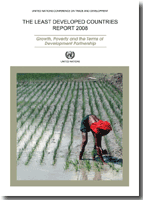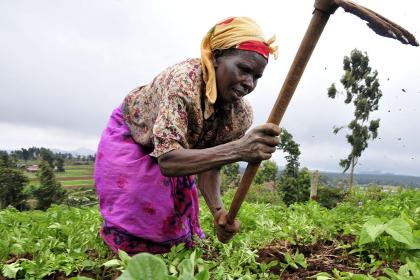
Least developed countries are achieving record rates of economic expansion, but growth is failing to trickle down into significantly improved well-being for the majority of their population. The Least Developed Countries Report 2008 argues that this results from the type of economic growth and development strategy that these countries are following. In order to decisively reduce material deprivation and embark on economic and social development, LDCs need to adopt new types of development strategies that are nationally formulated and owned. One of the elements of this change is to adopt management policies for the official development aid they receive.
Economic expansion in the LDCs since 2000 has been stronger than in the 1990s. In 2005 and 2006, there was a further growth acceleration and the LDCs together achieved the strongest growth performance for thirty years.
Rapid economic growth has been associated with a slow rate of poverty reduction and progress towards the Millennium Development Goals (MDGs). The LDCs as a group are unlikely to reach the goal of reducing the incidence of poverty by half between 1990 and 2015. Most of these countries are also off track to achieve most of the other MDGs. There is no evidence of a significant change in trends in social development since 2000, after the adoption of the Millennium Declaration and more socially-oriented policy reforms.
The LDCs remain very vulnerable to a growth slow-down as they are still characterized by low levels of domestic resource mobilization and investment, very weak development of manufacturing industries, high levels of commodity dependence, weak export upgrading, rising food and oil import bills and growing trade deficits.
Given this macroeconomic scenario and the pervasive poverty prevailing in LDCs, these countries have been hit very hard by soaring international food prices. In many of them the domestic price of some food staples has doubled. This is compressing the budget of poor families, which spend 50 - 80 per cent of their income on food. Therefore, the food crisis is likely to slow down - or even reverse - the limited progress achieved so far towards reducing poverty and malnutrition in LDCs.
The Report argues that the achievement of a more sustainable and inclusive type of economic growth requires effective national development strategies, which are supported by effective development aid and development-friendly international regimes for trade, investment and technology. Enhanced country ownership of national development strategies is critical for development and aid effectiveness. In order to reach these aims, LDCs are advised to implement aid management policies. These policies will allow aid to be more effective, providing a more powerful contribution to development. The proposals are critical to enhancing aid effectiveness and making the scale-up of aid work. They link to the assessment of the Paris Declaration on Aid Effectiveness, adopted in March 2005, which will take place in Accra, Ghana, in September 2008.




